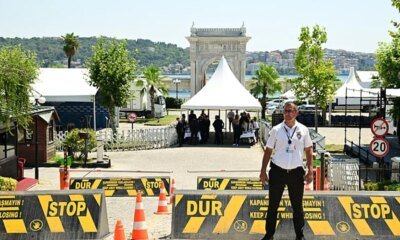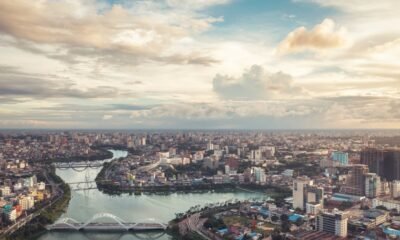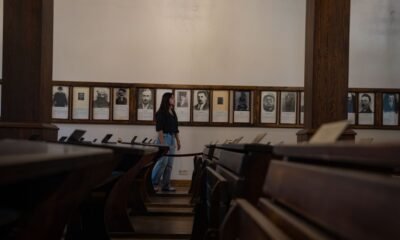Politics
Ankara condemns Israeli parliament’s call to annex occupied West Bank
Türkiye has strongly condemned the Israeli parliament’s recent resolution urging the government to annex the occupied West Bank, denouncing the move as a flagrant violation of international law and a dangerous provocation.
In a written statement issued Wednesday, the Foreign Ministry declared the resolution “null and void under international law and without any validity,” stressing that the West Bank is Palestinian territory that has remained under Israeli occupation since 1967.
The ministry criticized the move as part of broader efforts by Israel to undermine peace and destabilize the region.
“Any Israeli attempt at annexation is illegitimate and provocative,” the statement read, warning that Israel’s “violent policies and unlawful actions” are not only worsening the humanitarian crisis but also threatening international order and regional security.
Türkiye calls on the international community to take immediate and concrete steps to halt Israel’s actions, the statement said.
“Binding and deterrent measures must be taken without delay against genocidal Israel’s aggression; the legal and moral obligations of the international system must be effectively fulfilled,” the statement urged.
Earlier this week, the Israeli parliament voted in favor of a resolution calling on the government to annex the West Bank – territory internationally recognized as occupied Palestinian land. Of the 120 Knesset members, 71 supported the resolution, 13 opposed it, and the rest abstained.
The resolution claims the West Bank as “the historical, cultural and spiritual homeland of the Jewish people and an inseparable part of the Land of Israel.”
Israel’s presence in the West Bank, which it occupied in 1967, is considered an occupation under international law. Resolutions passed by the United Nations Security Council reject Israel’s annexation of these territories, which it acquired through war.
Escalating occupation
Israel’s settlement expansion and land seizure in the West Bank have intensified significantly. According to Peace Now, an Israeli NGO, land appropriations in the first quarter of 2025 have already exceeded the total for all of 2024.
Currently, over 451,000 Israeli settlers reside in the West Bank and another 230,000 in East Jerusalem, settlements considered illegal under international law. These settlers live under Israeli civil law, while approximately 4 million Palestinians in the West Bank remain under Israeli military rule.
Palestinians face harsh daily conditions, including road closures, frequent military raids and violent attacks from settlers. Human rights groups have repeatedly warned that these conditions amount to systematic discrimination and collective punishment.
Israel is already facing a genocide case at the International Court of Justice (ICJ) over its military actions in Gaza since Oct. 7, 2023.
Türkiye has been vocal in calling out what it describes as Israel’s genocidal policies and the failure of the international community to enforce legal standards.
With the annexation vote, critics warn that Israel is moving toward de jure annexation of Palestinian land, solidifying control in ways that would further derail prospects for a two-state solution.
Türkiye’s statement concluded with a call for immediate international accountability, warning that inaction could lead to deeper instability and irreparable damage to the peace process in the region.
Politics
No sabotage, trap will hinder terror-free Türkiye initiative: Erdoğan
No sabotage, provocation or trap will veer us away from the goal of a terror-free Türkiye, President Recep Tayyip Erdoğan said Wednesday.
“While breaking the wheels of corruption on one hand, we take steps to free Türkiye from the scourge of terrorism,” Erdoğan said during a graduation of the police academy in the capital Ankara.
“With our terror-free Türkiye process, we will, God willing, close an era filled with pain and tears and open wide the doors to a new era centered on brotherhood, peace, prosperity and development.”
The initiative was launched by government ally Devlet Bahçeli, head of the Nationalist Movement Party (MHP), who called on the PKK’s jailed leader, Abdullah Öcalan, to appeal to the PKK to lay down arms last year.
Soon, his call evolved into a new initiative that saw Peoples’ Equality and Democracy Party (DEM Party) lawmakers visiting Öcalan in the island prison where he is incarcerated in the Marmara Sea. As a result and in a landmark development, the PKK in May announced its dissolution and the end of its four-decade terror campaign that cost tens of thousands of lives in Türkiye, as well as in Iraq and Syria. Most recently, in a ceremony across the border in Iraq this month, PKK members destroyed their weapons as part of the process.
Justice and Development Party (AK Party) spokesperson Ömer Çelik also spoke on the issue the same day following the party’s Central Executive Committee (MYK) meeting.
He said Erdoğan, during his speech at the MYK, conveyed that the party must give utmost importance to the process and that some circles attempt to sabotage the initiative through causing confusion on the PKK’s laying down of arms.
“The terror-free Türkiye process, which Ankara has implemented as a state policy, will be carried out with great sensitivity and meticulousness. The AK Party will demonstrate the necessary sensitivity to maintain high energy levels and achieve results. This is being demonstrated by the People’s Alliance,” he said.
Çelik said that while the initiative will lead Türkiye to get rid of terrorism, it will also be a source of inspiration for the region.
Parliamentary commission
Ankara is at the same time also working on legal steps, establishing a parliamentary commission to follow up on the process of the PKK dissolving itself. This committee will make recommendations to the Parliament speaker regarding both administrative and legal regulations.
Çelik said that the commission would be announced within days.
“Here, our speaker’s sensitivity is to carry out this in a comprehensive manner, where all elements, all dynamics, and all political representations of Türkiye are reflected,” he added.
He once again reiterated that all parties must contribute to the process resulting positively.
During his visit to southern Adana province on Thursday, Justice Minister Yılmaz Tunç said: “We enter a period in which all kinds of terrorism have ended in the ‘Century of Türkiye’ and in which there is no violence, where everyone lives fraternally through strengthening our internal front.”
He added that the ministry would closely follow the works of the commission.
Republican People’s Party (CHP) Chair Özgür Özel also touched on the issue, saying: “The idea for this commission is ours. This commission must take the Kurdish issue in Türkiye as a whole within the scope of democratisation.”
Meanwhile, DEM Party Şırnak lawmaker Nevroz Uysal Aslan similarly said he expected the commission to begin works soon.
“From the very beginning, we have said that the establishment of this commission would create a legal basis for peace and democracy and strengthen social participation,” he said.
Aslan added that civil society should also be part of the commission’s works.
Politics
Greek Cyprus rejects aid offer from TRNC for forest fires
The Greek Cypriot administration on Thursday said it did not accept an aid offer by the Turkish Republic of Northern Cyprus (TRNC) for the ongoing forest fires on the island.
TRNC Prime Minister Ünal Üstel, during his visit to Ozanköy village in Girne, said Greek Cyprus rejected the offer made through the U.N.
Criticising their stance, Üstel said: “We offered help, but the Greek Cypriots didn’t accept it. They accept burning, but they don’t accept help.”
A fast-moving wildfire near the southern Cypriot city of Limassol has killed at least two people and forced widespread evacuations, local media said on Thursday.
The blaze broke out on Wednesday in a mountainous village about 20 kilometers (12 miles) north of Limassol and quickly spread, fanned by strong winds.
“We are all saddened by the fact that many settlements have had to be evacuated due to the forest fire that broke out today in the villages of Limassol and remains uncontrolled,” TRNC President Ersin Tatar said.
Highlighting the urgency of the disaster and the shared risk to human life and the environment, Tatar stressed that the offer of support is rooted in humanitarian responsibility.
The fire forced the evacuation of 14 villages along a 14-kilometer (8.7-mile) stretch of mountainous terrain.
Media reports showed gutted homes smoldering as flames swept through the outskirts of some villages. In the village of Lofou, at least 20 homes were destroyed as fires threatened a group of stranded evacuees whose police buses had to turn back as the fire front shifted to block their exit.
The island has been split between the Greek and Turkish Cypriot communities since 1974, when a Greek Cypriot coup aimed at Greece’s annexation of the island led to Türkiye’s military intervention as a guarantor power to protect Turkish Cypriots from persecution and violence in Cyprus. As a result, the TRNC was founded in 1983.
Greek Cypriots control the southern part of the island and are recognized by the international community as a state, despite protests from Turkish Cypriots and Türkiye. The TRNC is located in the northern part of the island and is recognized only by Türkiye.
It has seen an on-and-off peace process in recent years, including a failed 2017 initiative in Switzerland under the auspices of guarantor countries Türkiye, Greece and the U.K.
The Greek Cypriot administration entered the EU in 2004, the same year that Greek Cypriots single-handedly blocked a U.N. plan to end the longstanding dispute
Politics
Syrian official underlines national unity vis-à-vis YPG issue
A Syrian government official on Thursday emphasized the need for national unity as the country is in talks with the PKK’s Syrian wing, the YPG, for integration.
Speaking to Syria’s official state television channel, Al-Ikhbariyya, the official said that they would not accept the YPG’s request to join the national army as a bloc without fully integrating into it.
He said that calls for an independent identity are against the citizenship principle and would not be accepted.
The official added that national dialogue should be carried out not by force of arms or by relying on external forces, but on the basis of full commitment to the unity of the country.
He said the government rejected the possibilities of not leaving arms or entering the national army as a military bloc.
The YPG is the Syrian wing of the PKK, which started laying down arms after decades of violence, as part of the terror-free Türkiye initiative launched last year. The group was openly supported by the U.S., which had designated the PKK as a terrorist group years ago. Washington justified the armament of the YPG as part of its alliance with the YPG against another terrorist group, Daesh.
The YPG has been reluctant to join the PKK to abandon arms, while Ankara hopes that even if it does not join the PKK, it may integrate itself into the new Syrian army and therefore, cease its existence.
The YPG signed a deal with the new administration in Damascus in the wake of the fall of the Baathist regime last December for integration, but the deal showed little progress as the YPG repeatedly voiced its demand for a “decentralized” administration in the country, hoping to keep its self-styled autonomous entity in northeastern Syria intact. Damascus staunchly opposes it.
YPG detains 11 soldiers
Meanwhile, the YPG detained 11 Syrian soldiers in northern Aleppo province on the same day.
Syrian security sources speaking to Anadolu Agency (AA) said the group detained the soldiers who were crossing Aleppo’s southern Manbij district’s Deir Hafir region.
The YPG had transferred terrorists and weapons from the occupied Raqqa province to the Deir Hafir line during the clashes in the southern Suwayda province of the country.
Politics
July 15 association to expose coup, FETÖ facts in 54 countries
A new international initiative to share the truth about the July 15 coup attempt by the Gülenist Terror Group (FETÖ) has been launched, July 15 Association Chair Ismail Hakkı Turunç announced on Thursday.
Speaking at a news conference held at Istanbul’s Çamlıca Tower, Turunç said that delegations comprising relatives of martyrs, veterans and association representatives will visit 54 countries to recount the events of the failed coup.
“Initially, we’ve established connections with 13 countries,” Turunç said. “A martyr’s family member, a veteran and a representative from our association will travel to each of these countries to explain what happened on July 15.”
Turunç emphasized that FETÖ exploited the education sector as a disguise for its activities, misleading foreign audiences with a seemingly benevolent image. “We paid a heavy price,” he said, “but in doing so, we also revealed the group’s true face to the world. Now, we continue to share our story so others do not experience similar harm.”
He added that destinations were selected in coordination with the Foreign Ministry, embassies and the Turkish Cooperation and Coordination Agency (TİKA). Countries on the list span the Balkans, Asia, Europe, Africa and the Americas, including the U.S., Venezuela, Japan, South Africa and several EU nations.
When asked about outreach in the U.S., Turunç said they had applied for visas and plan to organize events if granted. “We speak on behalf of the nation. We have nothing to hide. Those who collaborated with coup plotters should be ashamed – not us,” he said.
The project aims to ensure that the July 15 coup attempt and its victims are not forgotten. The initiative will run throughout the year.
Politics
‘State institutions in full coordination for terror-free Türkiye’
The country is approaching a new era with the “terror-free Türkiye” initiative, Justice Minister Yılmaz Tunç said on Thursday, underlining full institutional coordination and public support to eliminate violence and ensure national unity.
Speaking during a meeting with Justice and Development Party (AK Party) officials in Adana, Tunç emphasized that recent developments point to a significant milestone in the fight against terrorism.
“We are making great strides in our goal for a Türkiye without terror. This is being pursued as a state policy and implemented with the full coordination of our institutions. It is closely monitored, and every step is taken with precision,” Tunç said, stressing that a terror-free Türkiye also means a stronger, more prosperous nation on the global stage.
He underscored that democracy and nationwide development are the foundations of this process, adding: “A Türkiye without terror means uninterrupted development in all 81 provinces and a more powerful economy.”
The initiative was launched by government ally Devlet Bahçeli, head of the Nationalist Movement Party (MHP), who called on the PKK’s jailed leader, Abdullah Öcalan, to appeal to the PKK to lay down arms last year.
Soon, his call evolved into a new initiative that saw Peoples’ Equality and Democracy Party (DEM Party) lawmakers visiting Öcalan in the island prison where he is incarcerated in the Marmara Sea. As a result, and in a landmark development, the PKK in May announced its dissolution and the end of its four-decade terror campaign that cost tens of thousands of lives in Türkiye, as well as in Iraq and Syria. Most recently, in a ceremony across the border in Iraq this month, PKK members destroyed their weapons as part of the process.
Ankara is at the same time also working on legal steps, establishing a parliamentary commission to follow up on the process of the PKK’s dissolution. This committee will make recommendations to the Parliament speaker regarding both administrative and legal regulations.
Justice belongs to courtroom
Turning to criticisms against Türkiye’s judiciary, Minister Tunç firmly defended judicial independence and transparency, saying, “Defense must take place in the courtroom, not in the streets or public squares. Everyone has the right to a fair trial, and when evidence and indictments are revealed, the public will see the truth for themselves.”
Responding to claims of political interference in legal proceedings, Tunç said that accusations should be addressed through legal channels.
“Nobody is declared guilty without due process. If there are claims, evidence must be presented to the prosecution or the court. Our judiciary works day and night. There may be mistakes, but the system allows for correction through appeals.”
Tunç also criticized ongoing media narratives portraying Türkiye’s judiciary as compromised.
“Some who lived through May 27, Sept. 12, and Feb. 28 now claim that the judiciary used to be completely independent. This is far from reality,” he said, pointing to the judiciary’s key role during the July 15, 2016 coup attempt. “The judiciary passed a major test on that night and has since undergone a deep cleansing from tutelage-era influences.”
Some circles have been criticizing the arrest of former Istanbul Mayor Ekrem Imamoğlu and the main opposition’s candidate for the 2028 elections, as being politically motivated. The government denies the accusations.
Recalling Türkiye’s struggle against various destabilizing efforts over the years – from the 2013 Gezi park protests and Dec. 17-25 judicial operations to the deadly PKK and Daesh attacks and finally the 2016 coup attempt – Tunç noted that each event was a steppingstone to subvert democratic governance.
“They failed on July 15, 2016, thanks to the nation’s glorious resistance. The people stood up and said, ‘We will not allow Erdoğan to be toppled. We will not let our independence be sold out,’” he said.
New constitution
Highlighting Türkiye’s efforts toward democratic reform, Tunç reiterated the government’s push for a new civilian constitution.
“Even the fact that our current Constitution was written by coup plotters is a sufficient reason to replace it. We are in the Century of Türkiye. We need a social contract that emphasizes human rights and freedoms and represents all segments of society.”
He called on political parties to reach a consensus in Parliament, adding: “If we succeed in drafting a new constitution endorsed by the people, it will be a legacy for future generations and a foundation for deeper democracy.”
President Recep Tayyip Erdoğan’s government has been pushing to overhaul Türkiye’s Constitution for over a decade now, which was enforced in 1982 following a military coup that led to the detention of hundreds of thousands of people along with mass trials, torture and executions, which still represents a dark period in Turkish political history.
The AK Party has a comprehensive draft prepared by a scientific council during the pandemic, which it’s hoping to submit to Parliament. AK Party ally Nationalist Movement Party (MHP) also has a constitution draft including over 100 articles.
Political stability, public trust
Concluding his remarks, Tunç underlined the AK Party’s 23-year uninterrupted governance, crediting public trust in Erdoğan and the party’s grassroots responsiveness. “If we distance ourselves from the people, they will distance themselves from us. We must always stand by the people, think like them, and implement their expectations.”
He called on party organizations to make the most of the two-and-a-half to three years remaining before the next elections, saying that continued economic recovery and the vision of a terror-free Türkiye would ensure sustained public support into 2028.
Politics
Türkiye refutes claims of mass release of convicted PKK terrorists
Justice Minister Yılmaz Tunç on Wednesday firmly rejected claims circulating in the media that some 700 convicted members of the PKK would be released following the terrorist group’s decision to disband, calling the numbers “absurd” and “untrue.”
Speaking to the press following a ceremony in Ankara, Tunç addressed allegations regarding the release of individuals linked to the PKK following a ruling by the Constitutional Court.
“Some outlandish figures are being named, that 200 people have been released, and 700 people will be released. These are untrue,” Tunç said. “This is a matter that was carried out within the framework of our Constitutional Court’s decision, in terms of the balance of crime and punishment and criminal justice.”
The controversy stems from the Constitutional Court’s annulment of a provision under Articles 220 and 314 of the Turkish Penal Code, which allowed individuals who were not formal members of terrorist organizations to be punished both for their actions and as if they were members.
Tunç explained that the Turkish Parliament had not made any legislative adjustments in response to the court’s ruling, which had led to complications in ongoing judicial processes, particularly for individuals involved in protests or demonstrations.
“When a person participated in an illegal demonstration, they received a penalty under Law No. 2911. However, they were subject to separate punishment, as if they were members of the organization that organized the illegal demonstration,” Tunç said.
The Constitutional Court, he noted, found this dual punishment excessive for a single act and annulled the provision based on the principle of proportionality in criminal justice.
Tunç emphasized that affected individuals would still be held accountable for the crimes they committed, but could no longer be additionally charged as members of the organization unless they were proven to be such.
“The figures reported to the press are also incorrect,” he said. “Presenting it as ‘200 people, 700 people were released because they were members of the PKK’ leads to misunderstandings.”
Terror-free Türkiye
Tunç also addressed questions about the broader terror-free Türkiye initiative, stating that the disarmament and dissolution of the PKK remain critical goals for the government.
“The process regarding the terrorist organization’s disarmament is being monitored,” Tunç said. “This is being followed in full coordination with the relevant institutions of our state.”
The terrorist group, which led a bloody campaign of violence that killed at least 40,000 people over four decades, began laying down arms earlier this month.
Thirty members of the group burned their weapons at a ceremony in northern Iraq, and more are expected to abandon arms in the coming months.
Turkish intelligence monitors the process while Parliament will form a committee to weigh next steps in the initiative, from the fate of disarmed PKK members to their sentencing.
Tunç confirmed that efforts are underway to establish a commission in Parliament to support the process, with inter-party meetings and dialogue ongoing.
Tunç stressed that the government is conducting the process transparently and with sensitivity, ensuring that no steps are taken that would offend the families of martyrs or unsettle the public.
Meetings with the PKK-affiliated Peoples’ Equality and Democracy Party (DEM Party) at the Justice Ministry have been part of this process, Tunç confirmed. Issues raised, including those related to judicial practices, sick convicts and decisions by administrative boards, are being reviewed.
“Actions regarding these issues can already be taken within the framework of our legislation, and we are all closely monitoring the process,” he added.
Media outlets reported that full disarmament of the PKK may take up to five months, and the committee is expected to outline a road map for the reintegration of PKK members into society, possible leniency in sentencing of the group’s members and confidence-building measures for the integration of former members of the PKK not involved in acts of terrorism.
Reports say the initiative will also extend to PKK convicts and elderly, ill inmates convicted of membership in the terrorist group, who may benefit from leniency in their prison terms, pointing out existing laws for such convicts. But this will likely require the removal of the PKK’s status as a national threat to Türkiye’s existence, something that the National Security Council, chaired by the president, has the final say.
-

 Daily Agenda2 days ago
Daily Agenda2 days ago5 years ago today survived the Hagia Sophia Mosque chains
-

 Politics2 days ago
Politics2 days agoCease-fire key to peace at Türkiye-Russia-Ukraine talks: Fidan
-

 Sports2 days ago
Sports2 days agoArda Güler left in cold as Mbappe snatches Real Madrid’s No. 10
-

 Sports2 days ago
Sports2 days agoGalatasaray flex firepower, top Cagliari 3-1 in preseason clash
-

 Refugees2 days ago
Refugees2 days agoTurkey mourns 5 volunteer firefighters killed battling wildfires
-

 Daily Agenda3 days ago
Daily Agenda3 days agoThe door opened to peace is Istanbul: Russia and Ukrainian delegations on the table
-

 Lifestyle3 days ago
Lifestyle3 days agoJourney through Bangladesh’s green heart to world’s longest beach
-

 Politics3 days ago
Politics3 days agoErdoğan marks 106th anniversary of Erzurum Congress




